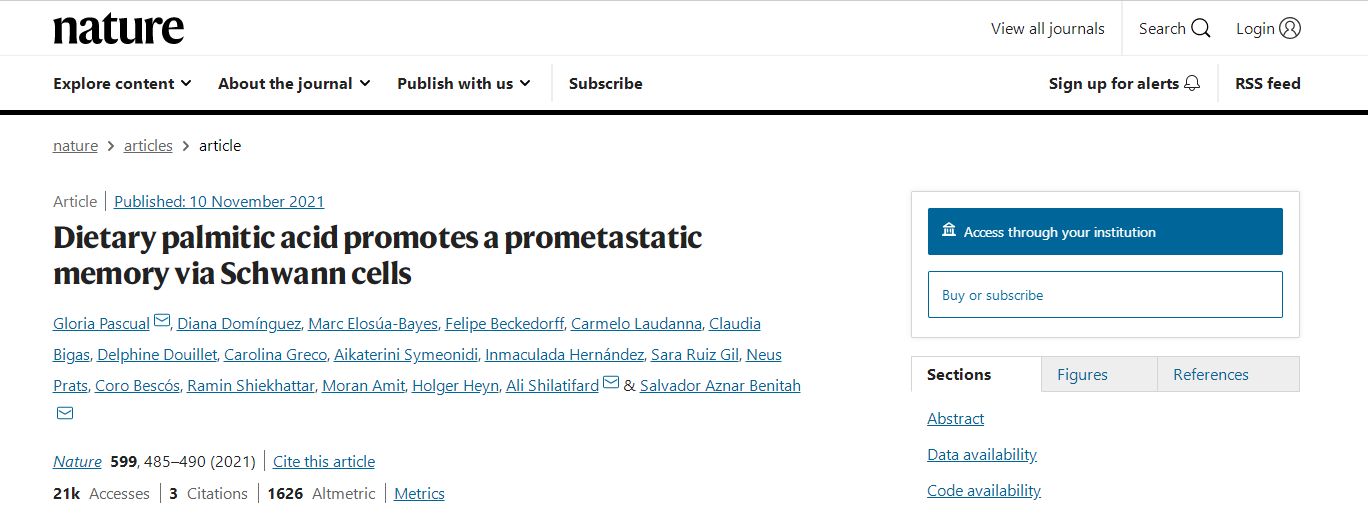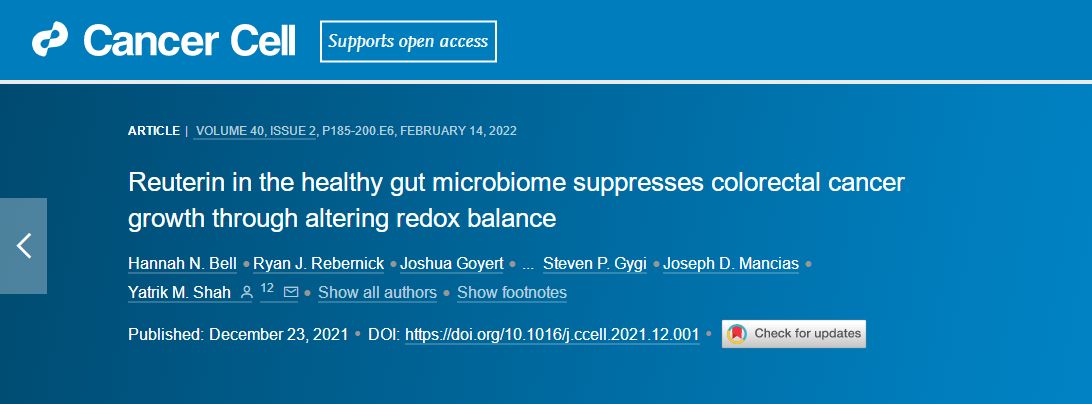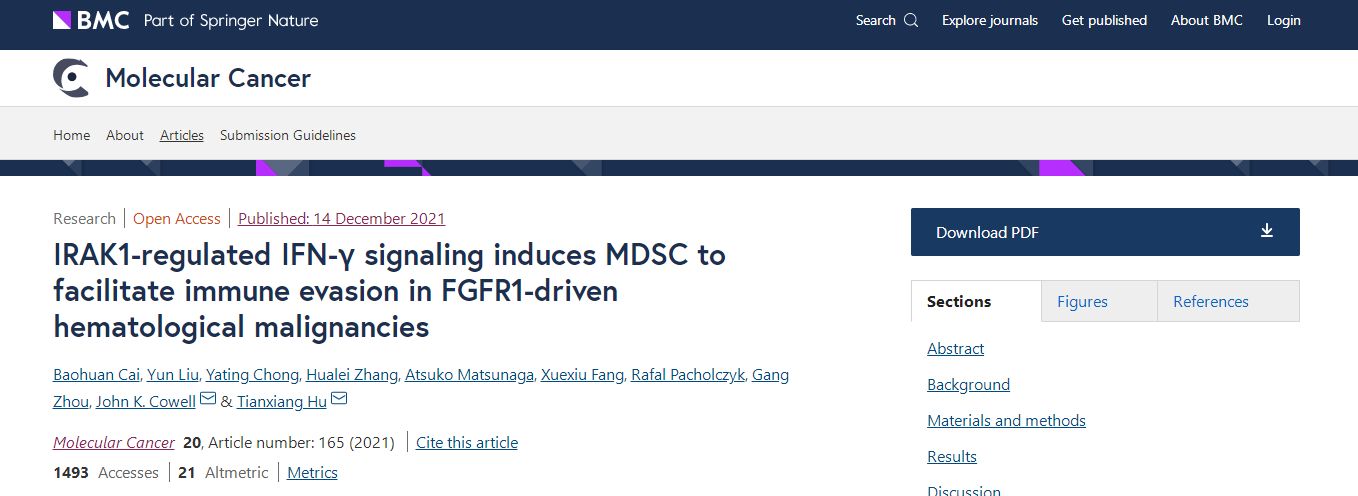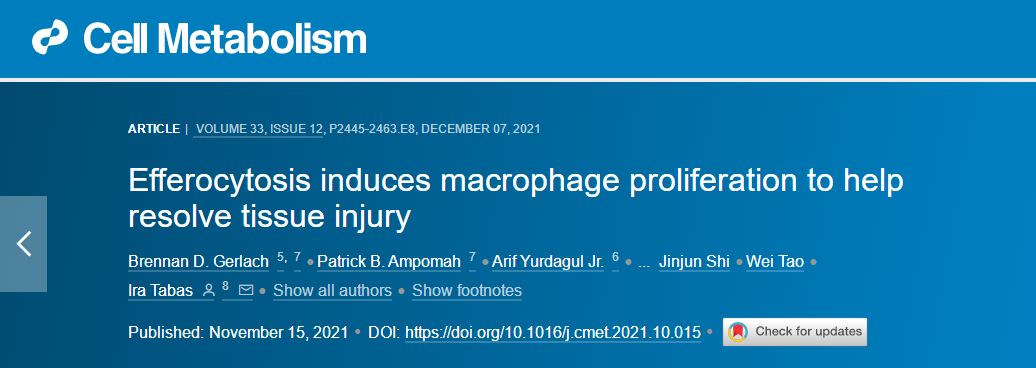

我们每月定期收集引用 Bioss产品发表的文献。截止目前,引用Bioss产品发表的文献共16342篇,总影响因子69181.658 分,发表在Nature / Science / Cell 以及 Immunity 等顶级期刊的文献共47篇,合作单位覆盖了清华、北大、复旦、华盛顿大学、麻省理工学院、东京大学以及纽约大学等国际知名研究机构上百所。我们每月收集引用 Bioss产品发表的文献。若您在当月已发表SCI文章,但未被我公司收集,也请致电我们,我们将赠予现金鼓励,金额标准请参考“发文章 领奖金”活动页面。
近期收录 2021 年11 月至2022年1月引用 Bioss 产品发表的文献共608篇(图一,绿色柱),文章影响因子 (IF) 总和:3573.71,20分以上文献:7篇,10分以上文献:53篇(图二)。
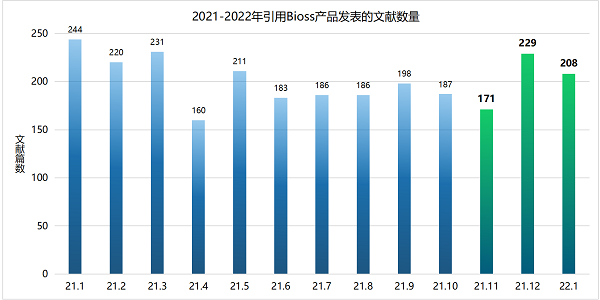
图一
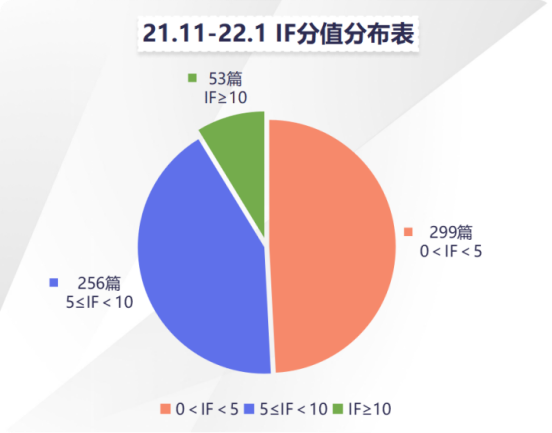
图二
本文分享来自 Nature Nanotechnology / Immunity / Cancer Cell 等期刊的7篇 IF>20的文献摘要,让我们一起欣赏这些文章吧。
文献 1
Institution : 巴塞罗那科学技术学院生物医学研究所摘要: Fatty acid uptake and altered metabolism constitute hallmarks of metastasis, yet evidence of the underlying biology, as well as whether all dietary fatty acids are prometastatic, is lacking. Here we show that dietary palmitic acid (PA), but not oleic acid or linoleic acid, promotes metastasis in oral carcinomas and melanoma in mice. Tumours from mice that were fed a short-term palm-oil-rich diet (PA), or tumour cells that were briefly exposed to PA in vitro, remained highly metastatic even after being serially transplanted (without further exposure to high levels of PA). This PA-induced prometastatic memory requires the fatty acid transporter CD36 and is associated with the stable deposition of histone H3 lysine 4 trimethylation by the methyltransferase Set1A (as part of the COMPASS complex (Set1A/COMPASS)). Bulk, single-cell and positional RNA-sequencing analyses indicate that genes with this prometastatic memory predominantly relate to a neural signature that stimulates intratumoural Schwann cells and innervation, two parameters that are strongly correlated with metastasis but are aetiologically poorly understood. Mechanistically, tumour-associated Schwann cells secrete a specialized proregenerative extracellular matrix, the ablation of which inhibits metastasis initiation. Both the PA-induced memory of this proneural signature and its long-term boost in metastasis require the transcription factor EGR2 and the glial-cell-stimulating peptide galanin. In summary, we provide evidence that a dietary metabolite induces stable transcriptional and chromatin changes that lead to a long-term stimulation of metastasis, and that this is related to a proregenerative state of tumour-activated Schwann cells.
文献 2
文献引用抗体:bs-6313R | Anti-4 Hydroxynonenal pAb | IFInstitution : 密歇根大学分子与综合生理学系摘要:Microbial dysbiosis is a colorectal cancer (CRC) hallmark and contributes to inflammation, tumor growth, and therapy response. Gut microbes signal via metabolites, but how the metabolites impact CRC is largely unknown. We interrogated fecal metabolites associated with mouse models of colon tumorigenesis with varying mutational load. We find that microbial metabolites from healthy mice or humans are growth-repressive, and this response is attenuated in mice and patients with CRC. Microbial profiling reveals that Lactobacillus reuteri and its metabolite, reuterin, are downregulated in mouse and human CRC. Reuterin alters redox balance, and reduces proliferation and survival in colon cancer cells. Reuterin induces selective protein oxidation and inhibits ribosomal biogenesis and protein translation. Exogenous Lactobacillus reuteri restricts colon tumor growth, increases tumor reactive oxygen species, and decreases protein translation in vivo. Our findings indicate that a healthy microbiome and specifically, Lactobacillus reuteri, is protective against CRC through microbial metabolite exchange.
文献 3
Institution : 法国勃艮第-弗朗什孔泰大学癌症生物学转移平台摘要:Chemotherapy with anti PD-1/PD-L1 antibodies has become the standard of care for patients with metastatic non-small cell lung cancer (mNSCLC). Using lung tumor models, where pemetrexed and cisplatin (PEM/CDDP) chemotherapy remains unable to synergize with immune checkpoint inhibitors (ICIs), we linked the failure of this treatment with its inability to induce CXCL10 expression and CD8+T cell recruitment. Using drug screening, we showed that combining a MEK inhibitor (MEKi) with PEM/CDDP triggers CXCL10 secretion by cancer cells and CD8+T cell recruitment, sensitizing it to ICIs. PEM/CDDP plus a MEKi promotes optineurin (OPTN)-dependent mitophagy, resulting in CXCL10 production in a mitochondrial DNA- and TLR9-dependent manner. TLR9 or autophagy/mitophagy inhibition abolishes the anti-tumor efficacy of PEM/CDDP plus MEKi/anti-PD-L1 therapy. In human NSCLCs, high OPTN, TLR9, and CXCL10 expression is associated with a better response to ICIs. Our results underline the role of TLR9- and OPTN-dependent mitophagy in enhancing chemoimmunotherapy efficacy.
文献 4
[IF=27.401] Molecular Cancer
Institution : 美国奥古斯塔大学乔治亚癌症中心
Stem Cell leukemia/lymphoma syndrome (SCLL) presents as a myeloproliferative disease which can progress to acute myeloid leukemia and is associated with the coincident development of B-cell and T-cell lymphomas. SCLL is driven by the constitutive activation of fibroblast growth factor receptor-1 (FGFR1) as a result of chromosome translocations with poor outcome. Mouse models have been developed which faithfully recapitulate the human disease and have been used to characterize the molecular genetic events that are associated with development and progression of the disease.
Methods
CRISPR/Cas9 approaches were used to generate SCLL cells null for Interleukin receptor associated kinase 1 (IRAK1) and interferon gamma (IFNG) which were introduced into syngeneic hosts through tail vein injection. Development of the disease and changes in immune cell composition and activity were monitored using flow cytometry. Bead-based immunoassays were used to compare the cytokine and chemokine profiles of control and knock out (KO) cells. Antibody mediated, targeted depletion of T cell and MDSCs were performed to evaluate their role in antitumor immune responses.
文献 5
[IF=27.287] Cell Metabolism
文献引用抗体:bs-6505R | Rabbit Anti-ALOX15 pAb | IF,IHCInstitution : 美国哥伦比亚大学欧文医学中心医学系摘要:Apoptotic cell clearance by macrophages (efferocytosis) promotes resolution signaling pathways, which can be triggered by molecules derived from the phagolysosomal degradation of apoptotic cells. We show here that nucleotides derived from the hydrolysis of apoptotic cell DNA by phagolysosomal DNase2a activate a DNA-PKcs-mTORC2/Rictor pathway that increases Myc to promote non-inflammatory macrophage proliferation. Efferocytosis-induced proliferation expands the pool of resolving macrophages in vitro and in mice, including zymosan-induced peritonitis, dexamethasone-induced thymocyte apoptosis, and atherosclerosis regression. In the dexamethasone-thymus model, hematopoietic Rictor deletion blocked efferocytosing macrophage proliferation, apoptotic cell clearance, and tissue resolution. In atherosclerosis regression, silencing macrophage Rictor or DNase2a blocked efferocyte proliferation, apoptotic cell clearance, and plaque stabilization. In view of previous work showing that other types of apoptotic cell cargo can promote resolution in individual efferocytosing macrophages, the findings here suggest that signaling-triggered apoptotic cell-derived nucleotides can amplify this benefit by increasing the number of these macrophages.
地 址: 北京市通州区马驹桥镇联东U谷西区四期67号楼
联系人: 秦
电 话: 4009019800
传 真: 010-58129612
Email:sales@bioss.com.cn
![]()



